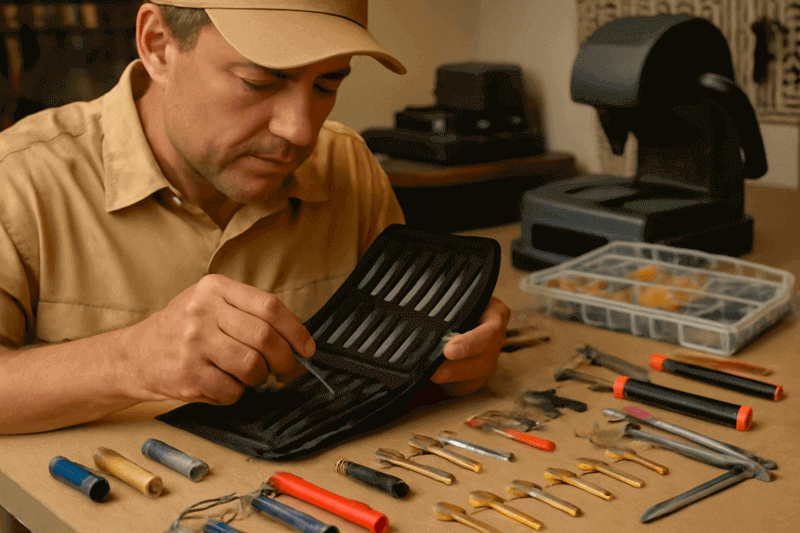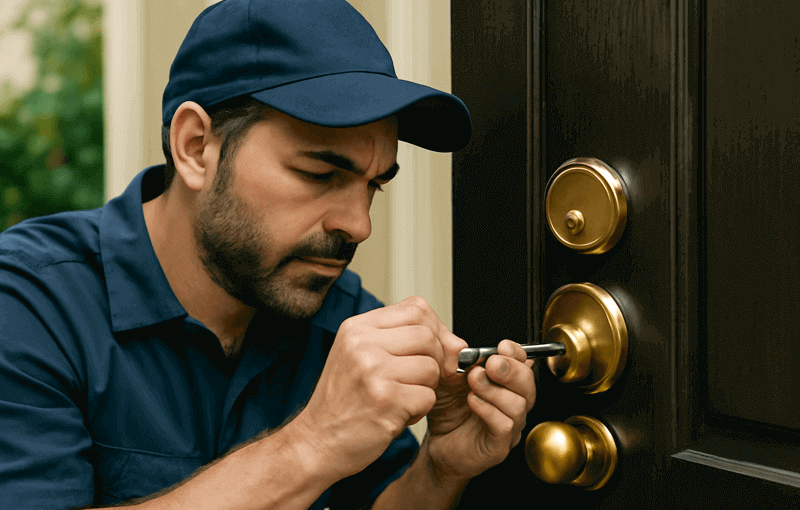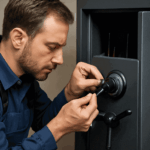If you’re wondering how to become a locksmith in Washington State, you’re in for some unique advantages. Washington State offers exceptional opportunities for aspiring locksmiths, as it’s one of only a handful of states that doesn’t require specific locksmith licensing. This regulatory approach creates both exciting opportunities and distinct challenges for those entering the profession.
While the absence of mandatory licensing means you can start working more quickly than in heavily regulated states, it also creates increased competition. It requires you to establish credibility through alternative means, like professional certifications and quality service delivery.
| Aspect | Details |
| State License Required | No, Washington does not require locksmith-specific licensing |
| Business License | Yes – General business license required (state or city level) |
| Training Required | Not mandatory, but highly recommended for credibility |
| Average Salary | $50,000 – $60,000 per year |
| Time to Start | Can begin immediately with a proper business setup |
| Key Requirements | Business license, insurance, bonding (recommended) |
| Professional Certifications | Optional but recommended (ALOA, etc.) |
Understanding Washington State Locksmith Regulations
No State Licensing Requirements for Locksmiths
Washington stands among the minority of states with no locksmith-specific licensing requirements. This regulatory framework means:
- No mandatory training, testing, or certification to legally practice as a locksmith
- Immediate entry opportunity for motivated individuals with a basic business setup
- Increased competition due to lower barriers to entry
- Greater emphasis on reputation and customer trust building
Legal Considerations and Compliance
Despite the lack of specific licensing, Washington locksmiths are required to comply with general business regulations. Consumer protection laws prohibit deceptive practices, require transparent pricing, and mandate honest advertising. Professional locksmith associations have established codes of conduct that represent industry best practices for service delivery.
Essential Business Requirements for Washington Locksmiths
Business License and Registration Process
Every locksmith operating in Washington must obtain proper business documentation:
State or Local Business License: Depending on your location, you’ll need either a state business license or a city-issued business license. Seattle, Spokane, and Tacoma each have specific requirements.
Business Structure Selection: Choose between sole proprietorship for simple operations, LLC formation for liability protection, or corporation establishment for larger operations.
Registration Requirements: Complete business name registration, obtain necessary local permits, and ensure compliance with zoning regulations.
Insurance and Bonding Requirements
While not legally mandated, these protections are essential for professional operation:
- General liability insurance ($1-2 million coverage recommended)
- Professional liability coverage for service-related claims
- Bonding services to provide customer protection and build trust
- Workers’ compensation insurance if employing staff
Tax and Financial Obligations
Proper financial setup includes federal and state tax identification number registration, sales tax permits for applicable services, professional accounting system implementation, and regular financial reporting procedures.
Training and Education Options for Washington Locksmiths
Formal Training Programs
Professional education provides the foundation for technical competency and customer confidence:
Trade Schools and Community Colleges: Institutions like Spokane Community College offer locksmith programs covering basic lock mechanisms, key cutting techniques, automotive fundamentals, and business operations. These programs typically range from 2-6 months.
Online Certification Courses: Digital learning platforms provide flexible scheduling with theoretical knowledge and practical applications through virtual demonstrations.
Specialized Training Programs: Intensive programs focus on specific areas like automotive locksmithing, safe services, or electronic security systems.
Apprenticeship and Hands-On Learning
Traditional learning paths offer invaluable real-world experience:
- Mentorship under experienced locksmiths provides exposure to diverse challenges
- 3+ year apprenticeship programs with progressive responsibility growth
- Industry networking opportunities leading to referrals and partnerships
- Practical skill development with various lock types and security systems
Self-Study Resources
Self-motivated individuals can pursue education through technical manuals from manufacturers like Schlage and Kwikset, online tutorials, practice with lock-picking sets, and professional development through trade publications.
Professional Certifications and Career Development
Associated Locksmiths of America (ALOA) Certifications
The industry’s leading professional organization offers several certification levels:
Registered Locksmith (RL): Foundational certification demonstrating basic competency in lock installation, repair, and key cutting.
Certified Registered Locksmith (CRL): Advanced designation requiring extensive experience across multiple disciplines.
Specialized Certifications: Focus areas include:
- Certified Automotive Locksmith (CAL)
- Safe and Vault Technician (SVT)
- Physical Security Professional (PSP)
Benefits of Professional Certification
Certified locksmiths enjoy enhanced customer credibility, professional industry recognition, access to continuing education resources, and higher earning potential, typically 15-25% above non-certified competitors.
Essential Skills for Successful Washington Locksmiths
Technical Competencies
Master these core technical skills:
Lock Installation and Repair: Comprehensive understanding of mechanical lock mechanisms, from basic pin tumbler locks to high-security systems like Medeco.
Key Cutting and Duplication: Proficiency with manual and automated equipment, including code cutting for situations without original keys.
Automotive Locksmithing: Modern vehicles require specialized knowledge of transponder keys, proximity fobs, and electronic ignition systems.
Electronic Security Systems: Smart locks, access control systems, and integrated security platforms represent growing market segments.
Business and Customer Service Skills
Professional success depends on technical competency and business acumen:
- Exceptional customer communication and clear problem explanation
- Efficient time management and emergency response procedures
- Effective marketing, advertising, and business development
- Comprehensive record-keeping and documentation systems
Equipment and Initial Investment for Washington Locksmiths

Basic Tool Requirements
Professional locksmith work requires specialized tools representing a significant initial investment:
Essential Hand Tools: Professional lock pick sets ($200-500), plug followers and pinning kits ($150-300), and specialized drill bits ($100-200).
Key Cutting Equipment: Manual machines start around $300, while electronic code cutting machines range from $1,500-$5,000.
Automotive Tools: Basic entry tools cost $200-400, while advanced programming equipment ranges from $3,000-$10,000.
Investment Planning
Realistic startup costs typically range from $10,000-$25,000, including initial tools, vehicle setup, insurance fees, marketing materials, and working capital for the first 3-6 months.
Starting Your Locksmith Business in Washington
Service Specialization Opportunities
Washington’s diverse economy creates multiple niche opportunities:
Residential Services: Single-family homes and apartments throughout Seattle, Tacoma, and Spokane metro areas provide steady demand for lock installation and emergency services.
Commercial Applications: Businesses require access control systems, high-security locks, and master key systems.
Automotive Specialization: Washington’s car culture creates opportunities for automotive locksmith specialists.
Emergency Services: 24/7 lockout services command premium pricing but require a significant time commitment.
Career Prospects and Earning Potential
Income Expectations
Realistic earning projections vary based on location, specialization, and business model:
- Entry-level employees: $35,000-$45,000 annually
- Experienced professionals: $50,000-$60,000 per year
- Specialized experts: $70,000-$100,000+ for automotive specialists and security consultants
- Business owners: $60,000-$150,000+, depending on scale and service mix
Career Advancement Opportunities
Professional growth paths include technical specialization through advanced certifications, business expansion to multiple technicians and fleet vehicles, and transitioning to security consulting for businesses and government agencies.
Challenges and Market Considerations
Competitive Landscape
Washington’s regulatory environment creates unique market dynamics. Lower barriers to entry mean more competitors, requiring differentiation through quality and specialization. Without licensing requirements, customer reviews and professional certifications become crucial for business development.
Technology Evolution
The locksmith industry continues evolving rapidly. Smart lock integration requires new technical skills, modern vehicle security systems demand specialized training, and commercial clients expect integrated access control and surveillance systems.
Conclusion
Learning how to become a locksmith in Washington State presents unique opportunities due to the state’s accessible regulatory environment. While the lack of mandatory licensing allows for quick entry into the profession, long-term success requires dedication to professional training, business development, and customer service excellence.
The key to sustainable success lies in continuous learning, technology adaptation, and building lasting customer relationships through reliable service delivery. By investing in proper education, obtaining professional certifications, and maintaining high ethical standards, aspiring locksmiths can build thriving careers in Washington’s competitive but rewarding market.






